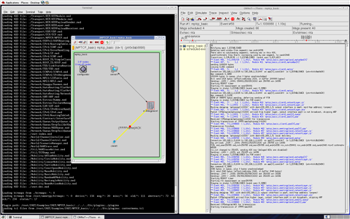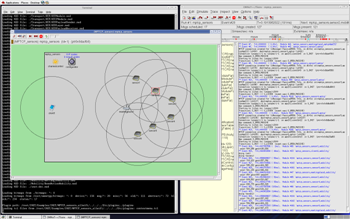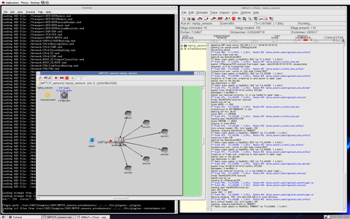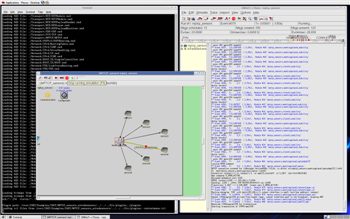|
A simple implementation of MPTCP
|
|
I've seen things you people wouldn't believe... :)
To test and evaluate the performances of MPTCP we developed a model in OMNeT++
that implements the most basic functions of the protocol. We also created a two test level-5 applications that send
and receive "fake" sensor data and we designed three "nodes" that support MPTCP.
The components of the simulations are:
- The implementation of the MPTCP protocol at Transport level.
- Sample applications that include the support for MPTCP sockets.
- Different types of nodes:
- StandardHostMPTCPEnabled: includes a PPP and a ETH interfaces.
- WirelessHostMPTCPEnabled: includes any number of ETH, PPP and 802.11 interfaces and the support for mobility.
- Three simple scenarios:
- MPTCP_basic: A simple topology with a Client and Server nodes connected via a Meeting Place by using 10mbps ethernet links.
- MPTCP_sensors_allwifi: An example for a "sensor network", where the Client delegates the Meeting Places to gather the
readings of 6 sensors. The Client eventually come back to the scene to get the collected data. All the operations are performed via 802.11 links.
- MPTCP_sensors_wired: Same as above, but the sensors are connected to the Meeting Place using ethernet connections instead of
radio links.
The simulations are well documented and simple to install, use and, possibly, to modify.
Click on the following screenshots to zoom.

The MPTCP_basic scenario, with a packet "on the wire" between the Client and the Meeting Place.

In the MPTCP_sensors_allwifi simulation, the circles represent the radio coverage of the 802.11 interfaces.

A 802.11 packet in the MPTCP_sensors_wired scenario is "flowing" from the Client to the Meeting Place.

A SYN packet is sent by the Meeting Place to a Sensor in order to establish a MPTCP connection.
|

